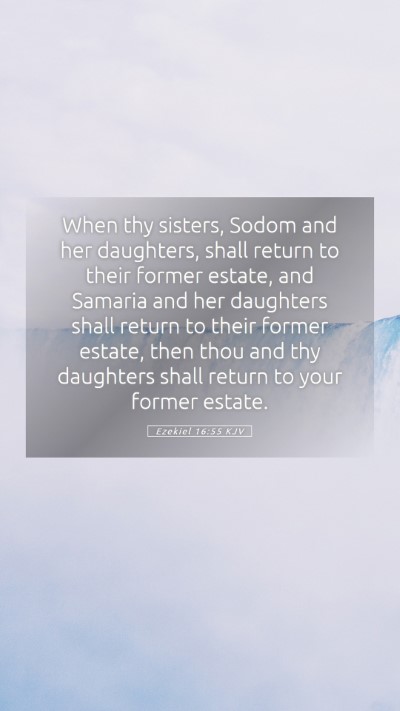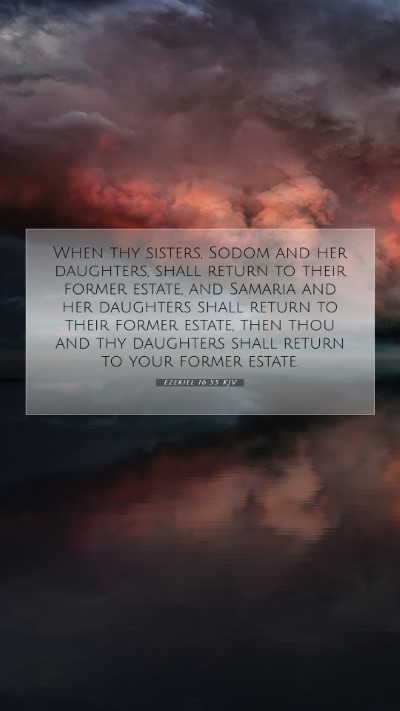Ezekiel 16:55 - Understanding Scripture
Ezekiel 16:55 states, “When your sisters, Sodom and her daughters, shall return to their former state, and Samaria and her daughters shall return to their former state, then you and your daughters shall return to your former state.” This verse is rich in meaning and requires diligent Bible verse commentary for a comprehensive understanding.
The prophetic imagery used in this verse encapsulates God's judgment and mercy while reflecting on the historical contexts of cities like Sodom and Samaria. In this analysis, we will draw insights from public domain commentaries including those of Matthew Henry, Albert Barnes, and Adam Clarke.
Contextual Background
This verse is situated within the larger narrative of Ezekiel 16, where God personifies Jerusalem and recalls its ingratitude despite His grace and provision. The mention of Sodom is critical here because it represents a peak of moral and social failure, and its restoration symbolizes substantial divine mercy.
Bible Verse Meanings
- Divine Justice: The restoration of Sodom and Samaria implies that God's punishment is not permanent. As detailed by Albert Barnes, historical judgment does not negate future grace.
- Humility and Restoration: Matthew Henry emphasizes that the acknowledgment of past failures is vital for restoration. Jerusalem must learn from the downfall of her “sisters” to genuinely turn back to God.
- Hope and Repentance: Adam Clarke points to the overarching theme of hope; that even those who have fallen deeply can be restored if they turn back to God in repentance.
Bible Verse Interpretations
This verse suggests a future scenario where cities historically associated with sin can have hope for change. Albert Barnes notes that the prophetic vision given to Ezekiel paints a picture of rejuvenation and transformation akin to a blossoming flower after a harsh winter.
Scripture Analysis
Understanding this verse calls for a deep dive into:
- Theological Implications: The relational dynamic between God and His people plays a critical role in the exegesis of this text.
- Historical Context: Knowledge of Sodom’s destruction and Samaria’s downfall aids in grasping the full weight of God's message to Jerusalem.
- Prophetic Literature: Insights from scholars can illuminate the apocalyptic imagery commonly found in prophetic books such as Ezekiel.
Application of Bible Verses to Daily Life
This verse offers practical life applications, such as recognizing the importance of humility, seeking repentance, and the belief in God's transformative power. As highlighted by Matthew Henry, those seeking restoration should look at the examples of Sodom and Samaria not as mere historical lessons but as personal reflections on the need for spiritual renewal.
Cross References
To deepen the understanding of Ezekiel 16:55, consider the following related scripture references:
- Genesis 19:24-25: The account of Sodom’s destruction further emphasizes the theme of divine judgment.
- Lamentations 3:22-23: This passage highlights God’s mercy, which is renewed every morning.
- Romans 11:1-2: This segment addresses the concept of God’s unchanging promise and the possibility of restoration for Israel.
Conclusion and Reflection
In conclusion, Ezekiel 16:55 provides a profound statement of God's justice and mercy. Through careful examination of the context, insights from biblical commentaries, and connections to other scriptures, readers can gain a fuller understanding of the hope embedded in this verse. This serves both as a warning against complacency and a beacon guiding us toward repentance and restoration.
Further Study
For those engaged in bible study groups or online bible study, exploring the themes within Ezekiel can open up discussions about morality, divine intervention, and the characteristics of God's covenant relationships with His people. Use this insight to facilitate bible study lessons that encourage profound personal and communal reflection.


